
Mawlānā Muhammad Abdullah Ghazi was a Pakistani Islamic scholar and theologian who served as Chairman of Ruet-e-Hilal Committee and as the first Imam and Khatib of Lal Masjid, and founded Faridia University and Jamia Hafsa.
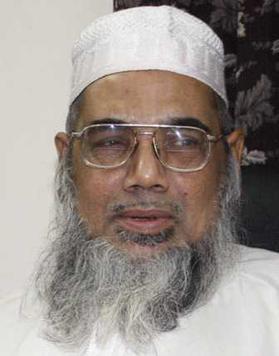
Faḍl al-Ḥaqq ibn Wājid ad-Dīn al-Amīnī, or simply Fazlul Hoque Amini was an Islamic scholar and politician from Bangladesh. He served as an MP in the Parliament of Bangladesh from 2002 to 2007. He was an expert in the fields of Islamic jurisprudence (fiqh), hadith and tasawwuf. He also held a number of positions on the boards of qaumi madrasahs. He was also the principal of Jamia Qurania Arabia Lalbagh in Lalbagh, Dhaka, one of the largest Deobandi Islamic schools of Bangladesh.

Hassan Jan Madani was a Pakistani Islamic scholar and politician who was born on 6 January 1938 in Prang, Charsadda. He has served as a member of the 8th National Assembly of Pakistan from 30 November 1988 to 6 August 1990. He was Shaikhul-Hadith at Darwesh Masjid in Peshawar and used to deliver Friday sermons in the same mosque. He was also the vice president of Wifaqul-Madaras, the largest board of Islamic universities (Jamiat).
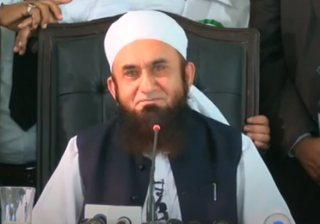
Tariq Jamil is a Pakistani Islamic cleric, preacher and member of the Tablighi Jama'at. The recipient of the Pride of Performance award, Tariq Jamil has been named in The 500 Most Influential Muslims year since 2012. In the 2024 edition of the publication, he was ranked 34th most influential Muslim alive and topped YouGov polls in 2018 and 2020 for Pakistan’s most admired man.

Idris Kandhlawi was a Pakistani Sunni scholar during the mid-twentieth century, widely recognized for his contributions to various fields of Islamic studies, including hadith, Quranic studies, Islamic jurisprudence, Prophetic biography, and theology. Holding the titles of Sheikh al-Hadith and Sheikh al-Tafsir, he traced his lineage to Abu Bakr on his father's side and Umar on his mother's side. He studied in Thana Bhawan under Ashraf Ali Thanwi. He studied hadith, first at Mazahir Uloom under Khalil Ahmad Saharanpuri, and later at Darul Uloom Deoband under Anwar Shah Kashmiri. He started his professional career at Madrasa Aminia and later went to Darul Uloom Deoband. In 1929 he took a position in Hyderabad State, where he had access to the Asafia Library. This experience enabled him to produce a five-volume Arabic commentary on Mishkat al-Masabih titled Al-Taleeq al-Sabeeh, of which the first four volumes were published in Damascus. His scholarly work garnered recognition in the Arab world. He later assumed the roles of Sheikh al-Tafsir at Darul Uloom Deoband and Sheikh al-Hadith wa al-Tafsir at Jamia Ashrafia. In addition, he served as the Chancellor of Islamia University of Bahawalpur during its tenure as Jamia Abbasia.

Khadim Hussain Rizvi was a Pakistani Islamic scholar and the founder of Tehreek-e-Labbaik, a religiopolitical organization founded in 2015, known to protest against any change to Pakistan's blasphemy law.
Mufti Muhammad Naeem was a Pakistani cleric and Islamic scholar who served as Chancellor of Jamia Binoria.

Muhammad Ilyas Ghuman is a Pakistani Islamic scholar and theologian of the Deobandi movement. Born in Sargodha to a Ghuman family, Ilyas studied at Jamia Binoria in Karachi and was a disciple of Azizur Rahman Hazarvi.
Saleemullah Khan was a Pakistani Islamic scholar and former President of Wifaq ul Madaris Al-Arabia, Pakistan. His students include Muhammad Rafi Usmani and Taqi Usmani. He established Jamia Farooqia in Karachi in 1967.
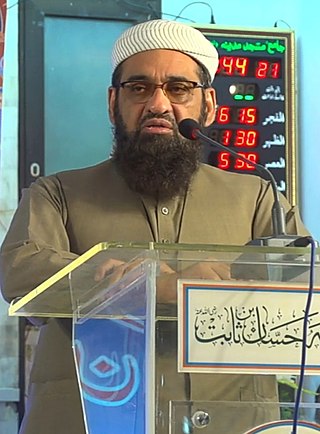
Mawlānā Muhammad Hanif Jalandhari is a Pakistani Islamic scholar, incumbent General Secretary of Wifaq ul Madaris Al-Arabia, Pakistan the rector of Jamia Khairul Madaris since 1981 and Chairman of Punjab Quran Board. He has also served as Vice-president of Wifaq ul Madaris Al-Arabia, Pakistan from 8 June 1989 to 2 March 1998.
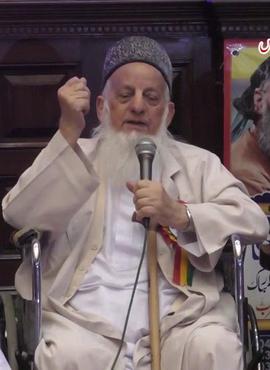
Abdur Razzaq Iskander was a Pakistani Islamic scholar and writer. He was the chancellor and senior hadith-professor of Jamia Uloom-ul-Islamia, emir of the Aalmi Majlis Tahaffuz Khatm-e-Nubuwwat and the president of Wifaqul Madaris in Pakistan. He was an alumnus of Darul Uloom Karachi, Jamia Uloom-ul-Islamia, Islamic University of Madinah and the Al-Azhar University. He authored books such as At-Tarīqat al-Asriyyah and Tahafuzz-e-Madāris.
Manzoor Ahmad Chinioti was a Pakistani Islamic scholar, politician and writer.
Muḥammad Adil Khan was a Pakistani Sunni Muslim scholar who served as the rector of Jamia Farooqia. He was seen as an influential scholar in Pakistan.
Jamia Farooqia is an Islamic seminary in Pakistan, having two branches, one located in the Shah Faisal Colony in Karachi, and the other in Hub Chowki.

Maulana Habibullah Mukhtar was a Pakistani Islamic scholar and writer who served as chancellor of Jamia Uloom-ul-Islamia and General secretary of Wifaq ul Madaris Al-Arabia, Pakistan.
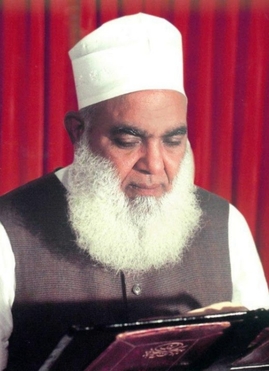
Ehtisham ul Haq Thanvi was a Pakistani Islamic scholar, researcher, Islamic jurist and khatib.
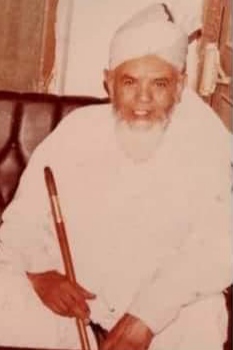
Ghulam Ullah Khan was a Pakistani Islamic scholar.
Muḥammad Isḥāq Bhaṭṭī was Pakistani Islamic scholar, journalist, historian and biographer of Islamic scholars. He was one of the leading writers of Islamic scholars in the Indian subcontinent.

Lieutenant Colonel (retd) Sultan Mohammed Khan Mengal was the oldest Pakistan Army veteran. He joined the British Indian Army in 1941 and was commissioned in the 5th Baluch in 1942. Following the independence of Pakistan, he joined Pakistan Army and retired as a Lieutenant Colonel in 1967. Sultan Mohammad also held pivotal positions in Balochistan after his retirement, such as the Vice Chancellor of University of Balochistan, the Commander of the Balochistan Dehi Muhaafiz and as Director of Project Kohlu. He died on 26 September 2021 in Quetta and was 103 years old at the time of his death.
Muhammad Anwar Badakhshani was an Afghan-born Pakistani scholar, writer and educator, known for his contributions to Islamic jurisprudence and literature. Born in Badakhshan, Afghanistan, he pursued his early education under the guidance of his uncle, Maulana Muhammad Sharif, before relocating to Pakistan in 1965 for advanced studies. Badakhshani's academic journey led him to esteemed institutions such as Jamia Farooqia and Jamia Uloom-ul-Islamia. His career spanned several decades, during which he taught various Islamic sciences and authored over forty books in Arabic and Persian. He also translated the Quran into Persian (Dari), a work that was widely published and recognized.












